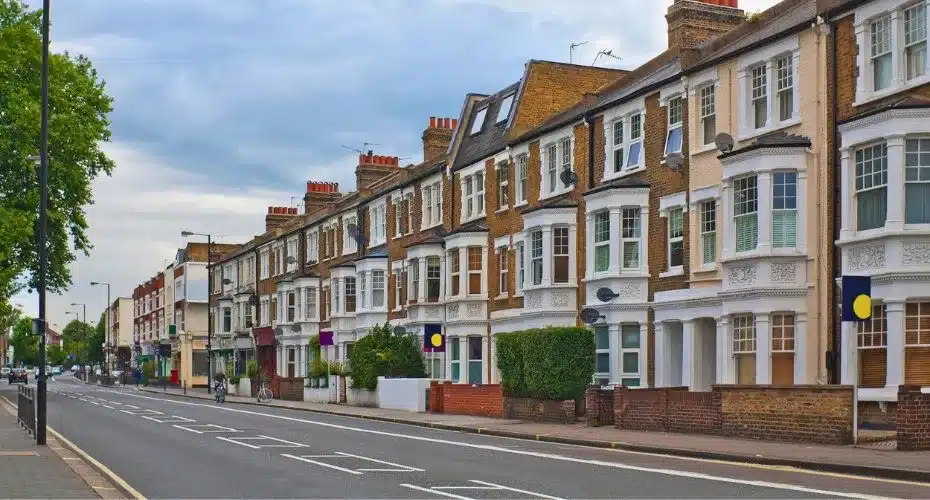Whether you’re chasing a dream job, diving into exciting studies, or simply looking for bustling city life, moving to London alone can be both thrilling and nerve-wracking. Especially when it comes to the budget – let’s face it, London isn’t exactly known for being cheap.
Having navigated the charming chaos of London life for over four years (and 10+ years in the UK), I’m here to spill the beans on 10 insider tips that will help you conquer your solo adventure. We’ll cover everything from the boring but necessary admin to making friends and navigating the tube like a pro. Most importantly, I’ll help you do it all without breaking the bank (if that’s even possible in London – let’s find out!).
10 insider tips for moving to London alone
1. Budget
It might not be the most glamorous topic to begin with, but let’s face it, moving to a new city comes with financial considerations. London, in particular, can be a pricier place to live. So understanding the financial aspects of moving helps you to plan effectively and enjoy your London adventure to the fullest.
London’s vibrant energy comes with a unique cost of living, but salaries might not always match the price tag, especially if you’re coming from a place like the US with typically higher wages. While the average Londoner brings home around £44,370 annually, living comfortably solo with this wage might require some compromises.
The truth is, how much you need to earn in London depends entirely on your choices and lifestyle. However, as a rough estimate, a salary of £50,000 to £60,000 per year can offer a relatively comfortable living experience for a single person in the city. While this might be a helpful starting point, living in London for less is absolutely possible. To help you decide if moving alone to London is financially feasible for you, let’s delve into the city’s living expenses. I’ll also give you some top tips for saving and making money in London in the following sections.
Budget considerations when moving to London alone
When budgeting, here are a few key things to take into consideration:
- Moving costs: Calculate all relocating costs, including transportation, potential storage fees, and initial setup costs for your new home.
- Rent: This will be one of the biggest expenses (likely the biggest). Research rents in your chosen area, keeping in mind that prices can vary significantly depending on location, size, and amenities. According to SpareRoom, the average monthly rent for a room in a flatshare in London is around £1,014. For a one-bedroom property, you can typically expect to pay anything between £1,600-£2,500 a month.
- Bills: Factor in essential utilities like electricity, gas, and water, as well as internet access and potentially a council tax bill. The monthly cost of bills can vary significantly, but the average bill ranges between £150 and £350 a month. The main cost factor will be whether you live alone or in a house share.
- Other essentials: Factor in essentials like groceries, transport, and phone plans. These typically range from £300-£400 monthly in total but can vary based on your individual needs and choices.
- Lifestyle choices: This includes extras like gym memberships, dining out, entertainment, and hobbies, ranging from tens to hundreds of pounds per month depending on your choices.
- Unexpected expenses: Life has a way of throwing curveballs, so be prepared for the unexpected. Factor in a buffer in your budget to cover unforeseen circumstances.
2. Find accommodation
London’s diverse options of neighbourhoods offer something for everyone, from bustling city centres to charming green pockets. But with so many options, where do you even begin?
Start your apartment or room hunt by exploring platforms like Rightmove, Zoopla, OpenRent, and SpareRoom. Remember, finding the perfect fit goes beyond just location. Consider your priorities and research neighbourhoods that align with your lifestyle:
- Commute: Calculate commute times to your workplace or study location using public transport apps like Citymapper or Google Maps.
- Amenities: Research the availability of essential amenities like supermarkets, parks, cafes, and entertainment options in your chosen area.
- Budget: Explore different neighbourhoods within your rent range, considering the trade-offs between location, amenities, and size. While affordability is key, factor in hidden costs like transport. Living further from central London often means longer commutes and travel expenses, potentially negating the appeal of lower rent. Generally, South and East London tend to be more budget-friendly compared to North and West London.
- Safety: Research crime rates and overall safety aspects of different areas using online resources or speaking to locals.
- Viewings: To avoid scams, always schedule in-person viewings for shortlisted properties. Photos and videos can only tell you so much, and seeing the space in person allows you to assess its suitability and ask the landlord or estate agent any questions you might have.
- Leave an offer: London’s rental market can be fierce. Good properties attract a lot of interest, and bidding wars are common. Unless you’re flexible with your move-in date or hunting during a slower season (such as December), you might need to offer above the advertised price to secure a place.

3. Secure temporary accommodation
For those moving to London alone, especially from overseas, securing temporary accommodation is a good idea. This approach offers two main benefits. Firstly, it allows you to explore different neighbourhoods before committing. Official lease agreements are typically a minimum of 6 months or even a year. Booking temporary housing allows you to experience different neighbourhoods firsthand, ensuring you find the perfect fit for your lifestyle and commute before committing to a long-term lease.
Secondly, it will give you peace of mind. Unfortunately, scams do exist within the housing market. By seeking temporary accommodation, you can avoid the risk of paying deposits or rent upfront until you’ve personally viewed the property and verified its legitimacy.
Hotels and hostels are always an option but you might also want to consider short-term rentals through websites such as Airbnb, Booking.com and Vrbo. They offer diverse accommodations, from studios to shared flats, allowing you to experience different neighbourhoods and potentially connect with local hosts. Meeting locals this way can offer valuable insights before you settle on your ideal long-term spot.
Alternatively, housesitting can be a budget-friendly and temporary option for newbies in London. Platforms like TrustedHousesitters and House Sitters UK connect homeowners with responsible individuals who can provide pet care and house security in exchange for free accommodation. This can be a great way to save on initial accommodation costs.
4. Familiarise yourself with the public transportation system
The big city’s vibrant pulse is best experienced by hopping on the London underground (affectionately known as the tube). You can simply tap in and out with your contactless debit/credit card, Google Pay, Apple Pay or Oyster card at the yellow card readers on buses and stations. This seamless system makes hopping on and off a breeze.
If you are a frequent traveller or commute a lot, check your eligibility for Railcards. They offer up to 1/3 off train and tube fares during off-peak times. You might also want to consider a weekly or monthly Travelcard.
A few unwritten rules ensure smooth sailing on the tube:
- Have your payment method ready way before reaching the barrier to avoid holding others up.
- Stand on the right of the escalator if you’re staying put, leaving the left side clear for those wanting to walk or run down.
- Offer your seat to those who need it most, like pregnant women or elderly passengers. Additionally, be mindful of the dedicated priority areas marked on the carriage and avoid occupying them when passengers with pushchairs or wheelchairs need access.
- Personal space becomes a luxury during peak times. Embrace the “sardine experience” and remember, everyone’s in the same boat (or tube, in this case).
Other transport options in London
While the tube reigns supreme, exploring London has other options:
- Buses: While not as fast as the tube, buses offer a scenic alternative, especially if your destination lacks a nearby station. They’re also a convenient option during strikes.
- Bikes and e-scooters: For short trips or exploring green spaces, consider renting a bike and cycling on London’s growing network of cycle paths. E-scooter rentals are currently limited to specific trial zones, so be sure to check regulations before hopping on one. Santander Cycles and Lime are some of the most well-known bike and e-scooter rental schemes in London.
- Taxis: While not the most budget-friendly option, taxis offer convenience, especially late at night. The iconic black cabs use meters, while apps like Uber, Bolt, or Gett offer more predictable fares.
- Car: Like most major cities, London isn’t exactly built for driving. Traffic jams, congestion charges, and high parking costs make driving in London expensive and frustrating. Unless you live on the outskirts or need a car for work, I recommend considering alternative transportation options.

5. Register with the local authorities
Here are some crucial steps to register with the local authorities and kickstart your smooth integration into London life:
1. GP: This ensures access to the National Health Service (NHS) and allows you to register with a local doctor for medical care.
2. National Insurance number (NI number): You will need this unique identifier to legally work in the UK and access various government services like tax and social security.
4. Electoral roll: This is not just about voting in local elections. Registering helps build your credit history, making it easier to access other financial services such as credit cards or loans. You can register even if you don’t currently plan to vote in a local election.
5. Local council: Unlike utility bills, council tax can be easily missed if you are new to the country. A council tax is a local government tax that helps fund local services like libraries, parks, and rubbish collection. The amount you pay depends on the property’s band (based on its value) and the number of occupants. Students don’t need to pay council tax. Also, familiarise yourself with your local council website, which provides information about local services like libraries, garbage collection, and recycling.
6. TV licence: You need to be covered by a TV licence to watch TV channels live on any TV service or streaming service. However, you don’t need a TV licence if you only ever use on-demand services, such as Netflix.
6. Open a local bank account
Opening an account might seem like a complicated process, especially as it often requires proof of address. This can be tricky for new arrivals who haven’t received utility bills or other formal proof yet.
Instead of the major banks, consider opening an account with a challenger company like Suits Me or Monzo. These innovative banks often have simple application processes and cater to people new to the UK.
Suits Me account opens instantly without a photo ID and delivers your debit card quickly. But you may want a premium account for regular use to avoid additional fees.
Monzo requires one of the following to open an account: a passport, driving licence or national ID card. It also offers a built-in budgeting app for financial control and fee-free international transactions, making it a great choice for managing your finances and travelling.
And if you need to transfer funds from your home country’s bank account to your new UK account, consider using Wise. They offer competitive exchange rates and low fees, ensuring your hard-earned money reaches your new home efficiently.
7. Meet new people
Moving to a new country and city where you don’t know anyone feels incredibly isolating, especially if you’re an introvert like me and find small talk exhausting. However, London’s vibrant social scene bursts with opportunities to meet new people. Whether you’re looking for new friends or even a chance at romance, there’s something for everyone.
Forming friendships often comes naturally for students at university or young professionals at work. However, the city’s fast pace and career focus can create a perception of Londoners being too busy for deep connections, leading some to feel friendships here remain surface-level. However, this doesn’t mean genuine, close friends are impossible to find in London. By exploring various avenues and venturing beyond immediate circles, you can find people with similar interests to you.
Best way to meet new people? Explore Meetup and social media groups around your interests, from photography and book clubs to language exchange or running clubs. Alternatively, sign up for a local sports team, fitness class, or dance workshop. Engaging in a shared activity is a fantastic way to meet like-minded people.
Volunteering your time is another rewarding option. Not only will you contribute to a worthy cause, but you’ll also connect with individuals who share your values and passions, creating valuable connections along the way.
And when it comes to dating, there are plenty of options to meet romantic candidates from singles’ parties and speed dating to dating apps. Tinder, Hinge and Bumble are some of the most common dating apps in London.

8. Download useful apps
To navigate London and make the most of your experience, consider downloading some of these apps:
1. Citymapper: This comprehensive app is your go-to for real-time journey planning across London’s extensive public transport network.
2. TfL Go: Developed by Transport for London (TfL), this app combines, a tube map and journey planning with contactless payment for travel.
3. The London Pass: If you plan on visiting several tourist attractions, consider investing in The London Pass.
4. Uber/Bolt/Gett: While London has an excellent public transport system, having access to ride-hailing apps can be handy for late-night journeys or convenient point-to-point travel, especially with luggage.
5. Uber Eats & Deliveroo: These popular food delivery apps offer a vast selection of restaurants and cuisines. You can order food directly to your doorstep when you’re craving a delicious meal or simply don’t feel like cooking.
6. Santander Cycles (for cycling) & Lime (for e-scooters and e-bikes): For short trips or exploring green spaces, consider cycling or renting an e-scooter. Download the app for the service provider of your choice, like Santander Cycles for cycling or Lime for e-scooters.
7. Too Good To Go: Fight food waste while saving money on delicious food surprises from restaurants, cafes, and shops across London. This app allows you to purchase “surprise bags” filled with unsold food nearing its expiration date at a significantly reduced price. It’s a win-win for your wallet and the environment!
8. Gorilla & Getir: These grocery delivery apps offer rapid grocery delivery within minutes, perfect for quick top-ups or when you’re short on time.
9. Toilets4London: This app helps you locate public toilets across London, a handy tool for exploring the city and knowing where to find restrooms when needed.
9. Find ways to save and make money
We already know by now that London is one of the world’s most expensive cities to live in. This means you want to have enough money to enjoy it properly. Thankfully, there are numerous ways to save money and even make additional income during your time in the capital.
Saving strategies in London:
- Embrace free activities: London offers a variety of free parks, museums, events, and activities. Explore these options to enjoy the city without breaking the bank. Some great options include:
- World-class museums: Immerse yourself in history and culture at the British Museum, Tate Modern, Natural History Museum, and many more, all with free entry.
- Beautiful parks: Relax in London’s sprawling green spaces, like Hyde Park, Regent’s Park, and St. James’s Park. They are perfect for picnics, walks, or simply soaking up the atmosphere.
- Unique events: Catch free open-air concerts, film screenings, and cultural events throughout the year. Check websites like Time Out for inspiration.
- Seek student discounts: If applicable, take advantage of student discounts on various services and entertainment options. Platforms such as Unidays are great for finding student discounts. And don’t hesitate to ask about available discounts when booking tickets or making purchases.
- Use cashback extensions and apps: Use browser extensions like TopCashback or Quidco while shopping online. These money-saving extensions and apps automatically search for available cashback deals and coupons on participating retailers.
- Embrace freebies and cheap eats: Look out for free trials, loyalty programs, and special offers. Use apps like Too Good To Go to save money on food nearing its expiry date, or explore budget-friendly restaurants with delicious lunchtime deals.
Making extra money in London:
- Flex your skills: Explore freelance work, online side hustles, or part-time jobs that fit your schedule and interests. Platforms like Fiverr and Upwork connect freelancers with various projects. Local businesses often offer flexible work opportunities as well, so keep your eyes peeled.
- Maximize your space: If you are lucky to have any unused space, consider renting it out for additional income. This could include:
- Spare room: You can list it on platforms like Airbnb for short-term stays. (But make sure you have your landlord’s permission.)
- Parking spot: If you have a driveway or off-street parking, rent it out to those in need. JustPark is a great place to advertise your parking space.
- Storage space: Do you have a spare room, attic, or unused shed? Offer it for storage to individuals or businesses.
- Declutter and earn: Sell your unwanted clothes and other items online on Vinted, Depop or eBay.
Related reading:
Best ways to save money in London
10. Be patient with yourself
Moving alone to a vibrant city like London can be both exhilarating and intimidating. Even more so if it’s your first time living in a foreign country. Stepping outside your comfort zone to embrace a new culture is an enriching experience, but it’s also normal to encounter culture shock. This feeling of disorientation and adjustment is a natural part of the process.
My last piece of advice is to be patient with yourself as you navigate new customs and a different way of life (and maybe even a language that isn’t your native language). It’s natural to encounter hurdles, feel overwhelmed, and even miss aspects of your home culture. Embrace the journey, learn from your experiences, and remember that settling into a new place and adapting to a new culture takes time. With a little patience and an open mind, you’ll be well on your way to enjoying all that this incredible city has to offer!
Final thoughts on moving to London alone
Moving to London alone can be a life-changing experience. It can offer you both personal and professional growth opportunities amidst the buzz of a global city. Navigating a new way of life and managing finances in a fast-paced and pricy city might present challenges. But with an open mind, a willingness to explore and proper preparation, you’ll soon discover the magic of calling London your home.

This article may contain affiliate links. If you sign up through these links, we may earn a small commission at no extra cost to you, supporting our content creation.
